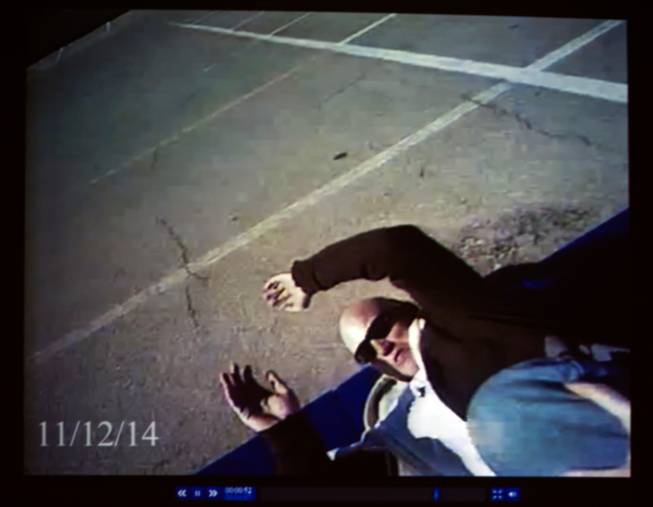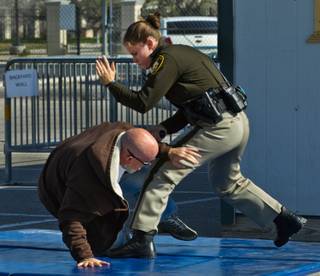
Video view from the body worn camera on Metro Police Officer Nicole Hemsey as she fights to control an angry suspect played by officer Chad Lyman during a media event at the Mohave Training Center on Wednesday, November 12, 2014.
Tuesday, March 10, 2015 | 2 a.m.
Related stories
Nevada lawmakers are pushing a bill that would require uniformed law enforcement officers to wear body cameras, mirroring the nation’s intensifying efforts to improve relationships between police and the communities they serve.
Introduced Monday by Assemblyman Harvey Munford, D-Las Vegas, Assembly Bill 162 is one of 87 pieces of body camera legislation being considered in 29 states, according to the Denver-based National Conference of State Legislatures.
Even supporters of AB 162 say the feasibility of the unfunded mandate is questionable, and it will likely be watered down significantly by a series of amendments proposed by law enforcement groups and civil rights advocates. At most, the bill will likely end up requiring police agencies to consider the new technology (which many are already doing).
But the state’s first body camera bill has special relevance because it has brought a national conversation about police accountability to the Legislature.
Here’s what you should know about AB 162:
Las Vegas police representatives, noting that a local body camera pilot program has proven to be expensive at $1.6 million, offered amendments that would heavily diminish the bill’s impact.
With the amendments presented by Metro Police lobbyist Chuck Callaway, the bill would only require agencies to research and develop policies and procedures for using recording equipment.
As it stands, the bill has bipartisan support from Munford, Assemblyman Jim Wheeler, R-Gardnerville; Assemblyman James Ohrenschall, D-Las Vegas; and Assemblywoman Shelly Shelton, R-Las Vegas.
But while no one opposed the bill at Monday’s hearing, several interest groups said they would not back AB 162 without Metro’s suggested limitations.
“A lot of the smaller agencies have advised they spent some money attempting to try to work something out, and they just ran out of funds,” Bob Roshak with the Nevada Sheriffs’ and Chiefs’ Association said while testifying. “It’s a great concept, we just need to figure out how to fund it.”
Civil rights advocates say the original bill raises privacy concerns, and they have offered their own set of amendments.
The American Civil Rights Union of Nevada proposed limiting officers’ recording capabilities — for instance, requiring them to turn off the devices when they enter private homes that are not crime scenes.
Vanessa Spinazola, the group’s representative, also offered amendments requiring law enforcement agencies to discard video footage that lacks “legitimate public value.”
“We want to protect people’s privacy, and that includes the privacy of police,” Spinazola said.
Spinazola said she supported efforts to outfit officers with the gadgets. Other groups who spoke in favor of the effort on Monday included the National Association for the Advancement of Colored People, the Independent American Party of Nevada and the Clark County Black Caucus.
As law enforcement agencies scramble to equip their ranks, researchers and experts nationwide have called for restraint. They point to questions about the performance and cost effectiveness of this relatively new technology.
Metro’s $1.6 million pilot program — the biggest undertaking of its kind — is supposed to help law enforcement agencies nationwide answer those questions by studying the behavior of 197 officers wearing the gadgets.
“If you’re forcing a community to do this through legislation and the community in fact does not have a serious problem with police shootings, you’re putting that community with a very difficult financial burden,” said Chip Coldren, a researcher with CNA Corp.’s Institute for Public Research, a Virginia-based firm that is leading the Metro study.
But Munford, whose district includes the predominantly black West Las Vegas neighborhood, dismissed the warning on Monday and said local governments need to prioritize concerns about racial bias and find a way to come up with funding for the cameras.
“It seems like we find money for things that we want,” Munford said. “I think there’s a way.”


Join the Discussion:
Check this out for a full explanation of our conversion to the LiveFyre commenting system and instructions on how to sign up for an account.
Full comments policy